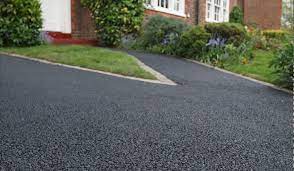Rubber driveways have become increasingly popular in recent years due to their unique properties and versatility. Made from recycled rubber, these driveways are durable, weather-resistant, and low-maintenance. In this article, we will explore the pros and cons of rubber driveways.
Pros:
Durable and Long-Lasting: Rubber driveways are highly durable and can last for many years with minimal maintenance. This is because rubber is a tough and resilient material that can withstand heavy use and extreme weather conditions.
Low-Maintenance: Rubber driveways require minimal maintenance compared to other types of driveways. They do not require regular sealing or repaving, and can simply be cleaned with a hose or power washer. This can save homeowners both time and money in the long run.
Weather-Resistant: Rubber driveways are resistant to weather damage, including freeze-thaw cycles, UV rays, and extreme heat. This means that they are less likely to crack or deteriorate over time, and can maintain their appearance and functionality for many years.
Eco-Friendly: Rubber driveways are made from recycled materials, typically from old tires, making them an environmentally friendly option. This also helps to reduce the amount of waste that ends up in landfills.
Slip-Resistant: Rubber driveways are slip-resistant, providing a safer surface for vehicles and pedestrians. This is particularly beneficial in areas with high foot traffic or where water may accumulate, such as on a sloped driveway.
Cons:
Limited Color Options: Rubber driveways come in a limited range of colors, typically black, brown, or gray. This can be a disadvantage for homeowners who want a specific color to match their home’s exterior or landscaping.
Higher Upfront Cost: Rubber driveways can be more expensive to install than other types of driveways, such as concrete or asphalt. This is due to the higher cost of the raw materials and the specialized equipment required to install them.
Susceptible to Staining: Rubber driveways are susceptible to staining from oil, gasoline, and other chemicals. This can be difficult to remove and may require professional cleaning.
Not Suitable for Heavy Vehicles: Rubber driveways may not be suitable for heavy vehicles, such as RVs or large trucks, as they can cause damage to the surface over time.
May Develop Grooves or Indentations: Over time, rubber driveways may develop grooves or indentations from the weight of vehicles or foot traffic. While this does not necessarily impact the functionality of the driveway, it may affect its appearance.
Conclusion:
Rubber driveways offer a range of benefits, including durability, low-maintenance, and eco-friendliness. However, they also come with a few disadvantages, including limited color options and higher upfront cost. Ultimately, whether or not a rubber driveway is right for you will depend on your specific needs and preferences. If you prioritize durability, weather-resistance, and low-maintenance, a rubber driveway may be the right choice for you.

